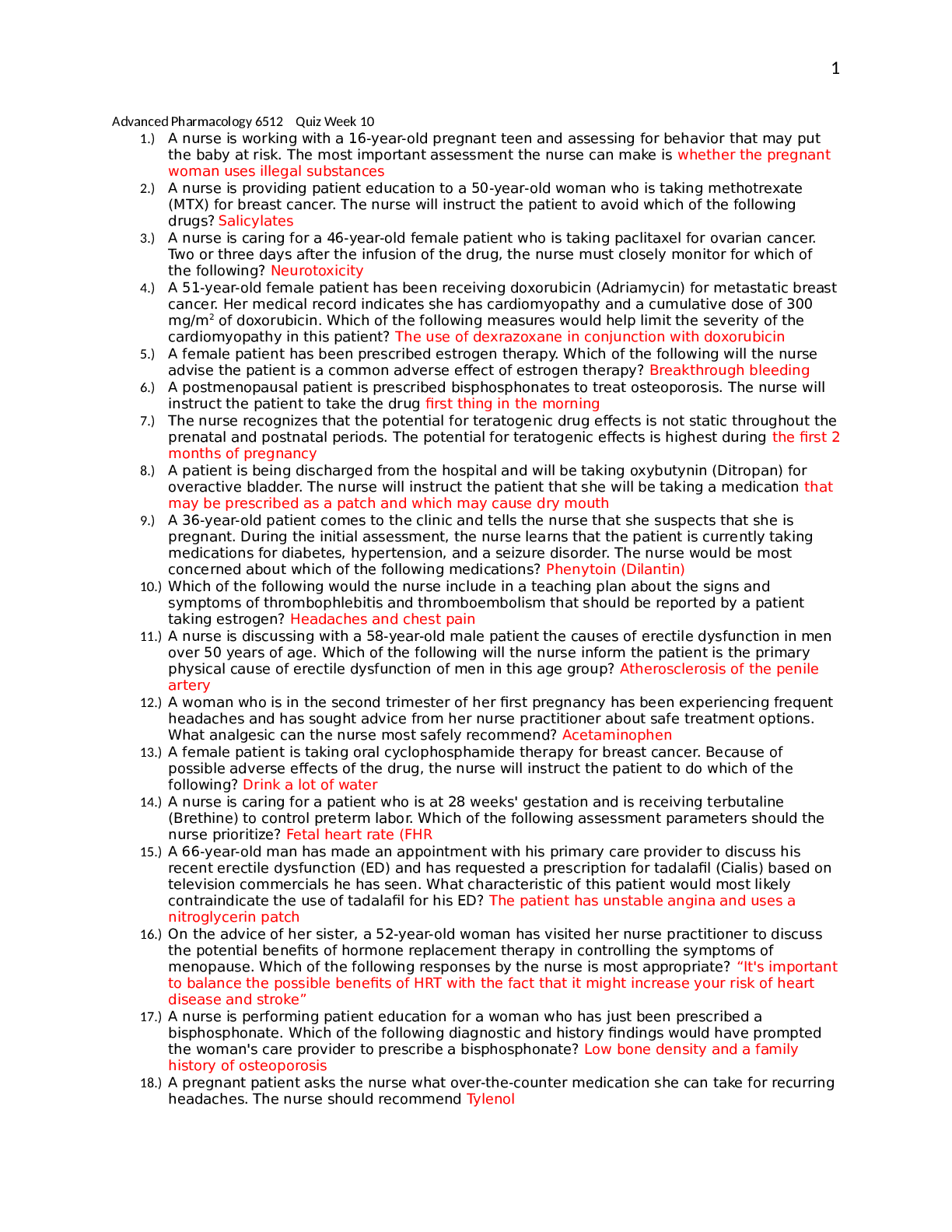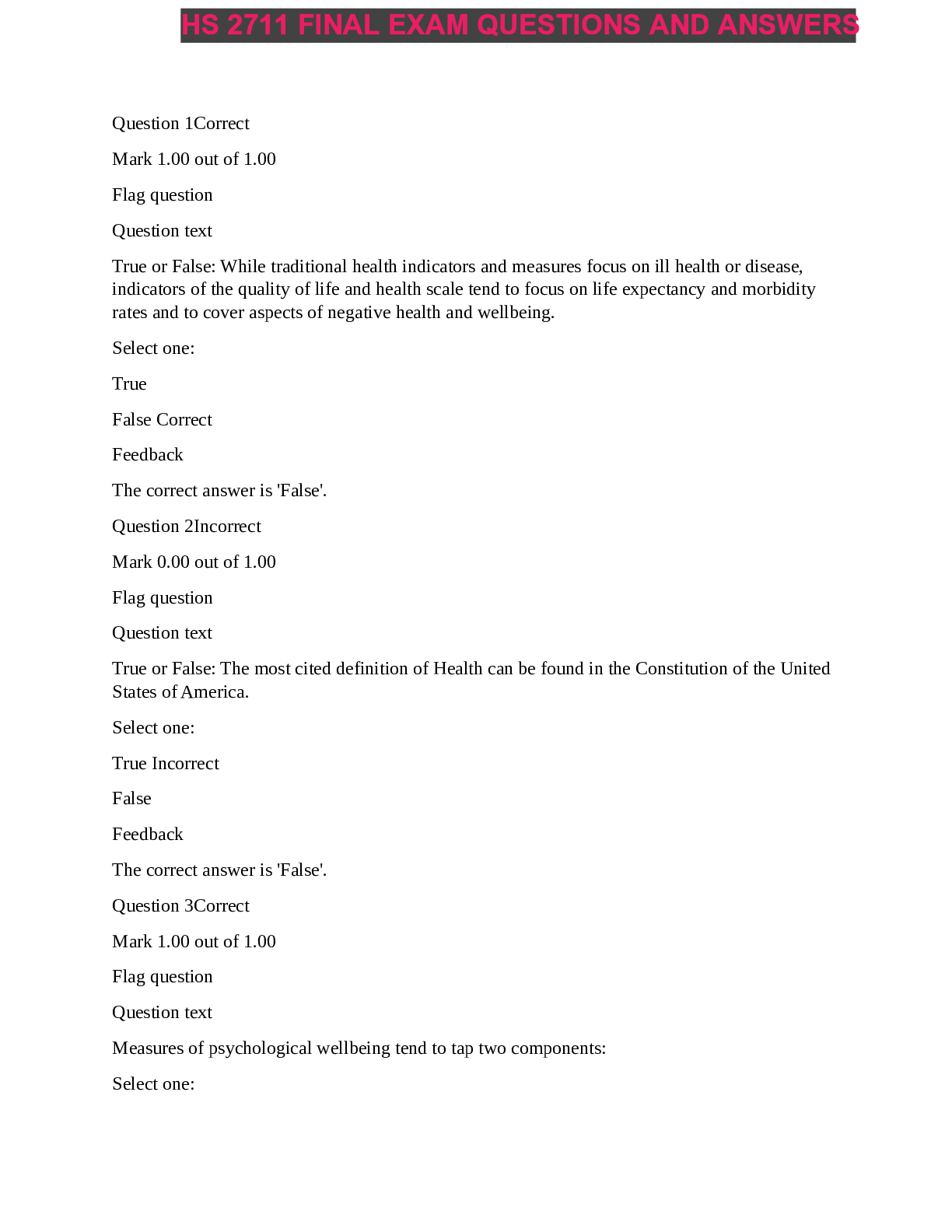Pharmacology > Final Exam Review > Walden University NURS 6521N Final Exam Pharmacology (101 Questions+Answers) (All)
Walden University NURS 6521N Final Exam Pharmacology (101 Questions+Answers)
Document Content and Description Below
A nurse is working with a 16-year-old pregnant teen and assessing for behavior that may put the baby at risk. The most important assessment the nurse can make is whether the pregnant woman uses illega... l substances 2.) A nurse is providing patient education to a 50-year-old woman who is taking methotrexate (MTX) for breast cancer. The nurse will instruct the patient to avoid which of the following drugs? Salicylates 3.) A nurse is caring for a 46-year-old female patient who is taking paclitaxel for ovarian cancer. Two or three days after the infusion of the drug, the nurse must closely monitor for which of the following? Neurotoxicity 4.) A 51-year-old female patient has been receiving doxorubicin (Adriamycin) for metastatic breast cancer. Her medical record indicates she has cardiomyopathy and a cumulative dose of 300 mg/m2 of doxorubicin. Which of the following measures would help limit the severity of the cardiomyopathy in this patient? The use of dexrazoxane in conjunction with doxorubicin 5.) A female patient has been prescribed estrogen therapy. Which of the following will the nurse advise the patient is a common adverse effect of estrogen therapy? Breakthrough bleeding 6.) A postmenopausal patient is prescribed bisphosphonates to treat osteoporosis. The nurse will instruct the patient to take the drug first thing in the morning 7.) The nurse recognizes that the potential for teratogenic drug effects is not static throughout the prenatal and postnatal periods. The potential for teratogenic effects is highest during the first 2 months of pregnancy 8.) A patient is being discharged from the hospital and will be taking oxybutynin (Ditropan) for overactive bladder. The nurse will instruct the patient that she will be taking a medication that may be prescribed as a patch and which may cause dry mouth 9.) A 36-year-old patient comes to the clinic and tells the nurse that she suspects that she is pregnant. During the initial assessment, the nurse learns that the patient is currently taking medications for diabetes, hypertension, and a seizure disorder. The nurse would be most concerned about which of the following medications? Phenytoin (Dilantin) 10.) Which of the following would the nurse include in a teaching plan about the signs and symptoms of thrombophlebitis and thromboembolism that should be reported by a patient taking estrogen? Headaches and chest pain 11.) A nurse is discussing with a 58-year-old male patient the causes of erectile dysfunction in men over 50 years of age. Which of the following will the nurse inform the patient is the primary physical cause of erectile dysfunction of men in this age group? Atherosclerosis of the penile artery 12.) A woman who is in the second trimester of her first pregnancy has been experiencing frequent headaches and has sought advice from her nurse practitioner about safe treatment options. What analgesic can the nurse most safely recommend? Acetaminophen 13.) A female patient is taking oral cyclophosphamide therapy for breast cancer. Because of possible adverse effects of the drug, the nurse will instruct the patient to do which of the following? Drink a lot of water 14.) A nurse is caring for a patient who is at 28 weeks' gestation and is receiving terbutaline (Brethine) to control preterm labor. Which of the following assessment parameters should the nurse prioritize? Fetal heart rate (FHR 15.) A 66-year-old man has made an appointment with his primary care provider to discuss his recent erectile dysfunction (ED) and has requested a prescription for tadalafil (Cialis) based on television commercials he has seen. What characteristic of this patient would most likely contraindicate the use of tadalafil for his ED? The patient has unstable angina and uses a nitroglycerin patch 16.) On the advice of her sister, a 52-year-old woman has visited her nurse practitioner to discuss the potential benefits of hormone replacement therapy in controlling the symptoms of menopause. Which of the following responses by the nurse is most appropriate? “It's important to balance the possible benefits of HRT with the fact that it might increase your risk of heart disease and stroke” 17.) A nurse is performing patient education for a woman who has just been prescribed a bisphosphonate. Which of the following diagnostic and history findings would have prompted the woman's care provider to prescribe a bisphosphonate? Low bone density and a family history of osteoporosis 18.) A pregnant patient asks the nurse what over-the-counter medication she can take for recurring headaches. The nurse should recommend Tylenol 19.) A male patient is experiencing climacteric symptoms secondary to androgen deficiency. His physician has prescribed testosterone. The nursing assessment reveals that the patient has had a myocardial infarction. The combination of testosterone therapy and a history of myocardial infarction would place that patient at a significantly higher risk of hypercholesterolemia 20.) A nurse is working with a patient in the clinic who has erectile dysfunction. The patient has been prescribed sildenafil (Viagra). The patient wants to do everything he can to promote effectiveness of the drug. The nurse will instruct him to avoid taking the drug with a high-fat meal 21.) Alprostadil (Caverject), a drug used to treat erectile dysfunction, has been prescribed to a 42- year-old patient. When providing education to the patient and his wife, the nurse should inform the wife about which of the following adverse effects? Vaginal burning 22.) A nurse is explaining to a pregnant 21-year-old college student why she cannot continue to take ibuprofen (Advil) for her headaches. The nurse draws a picture depicting drug molecules crossing the placental membrane and entering into the fetal circulation. The nurse tells the patient that the main reason this happens is because drugs compete with the hormones of pregnancy for albumin-binding sites 23.) A 20-year-old woman will soon begin taking oral contraceptives for the first time. What advice should the nurse provide to this patient? “Make sure to seek care quickly if you experience bad headaches, calf pain, or changes in vision.” 24.) A patient is taking flavoxate hydrochloride (Urispas) to help control an overactive bladder. On a follow-up visit to the clinic, the nurse will question the patient about which of the following? Dental hygiene practices 25.) A nurse is instructing a 19-year-old female patient on the use of fluconazole for candida vaginitis. A teaching priority will be to use an alternative form of birth control, if taking an oral contraceptive 26.) A nurse practitioner is reviewing the prepregnancy medication regimen of a patient who has just had a positive pregnancy test. The nurse should be aware of which of the following changes in pharmacokinetics that accompanies pregnancy? Increased drug distribution resulting from hemodynamic changes 27.) A 68-year-old man is being treated for benign prostatic hypertrophy (BPH) and began treatment with finasteride (Proscar) 3 months ago. When planning the care of this patient, what desired outcome should the nurse prioritize? The patient will experience complete bladder emptying 28.) A 54-year-old woman with a history of osteoporosis has been prescribed ciprofloxacin for recurrent cystitis. Because of the patient's history, the nurse would be sure to discuss with the woman the use of food containing iron or calcium 29.) A man is prescribed ciprofloxacin to treat a sexually transmitted infection. The nurse will instruct the patient to complete the entire course of drug therapy 30.) A nurse is working in a women's hospital where she is caring for a new mother who is experiencing postpartum urinary retention. Bethanechol (Urecholine) has been ordered. The nurse will observe for which of the following? Hypertension 31.) A 73-year-old woman has osteoporosis and is prescribed alendronate. She takes calcium and vitamin D supplements, drinks lots of water, and has just quit smoking. The nurse should advise the patient to also perform light-weight exercises and go for walks 32.) A 59-year-old man with a recent history of erectile dysfunction has been assessed and prescribed sildenafil (Viagra). When providing patient education to this man, the nurse should tell him which of the following? “You might find that your face becomes flushed or you get a headache after you take Viagra.” 33.) A woman is receiving magnesium sulfate for intrapartum eclampsia. The patient is perspiring and her blood pressure is 88/50. The serum magnesium level is 10 mg/dL. The nurse will interpret these manifestations as magnesium sulfate toxicity 34.) A 56-year-old woman will soon begin treatment of her overactive bladder with tolterodine (Detrol). What patient teaching should the nurse provide to this woman? “You might find that you get a dry mouth or a headache from this drug, but this does not mean it has to be discontinued.” 35.) A 36-year-old woman with a history of dysmenorrhea has begun treatment with progesterone, which she will be receiving by the intramuscular route. The nurse participating in the woman's care should prioritize which of the following potential nursing diagnoses? Risk for Injury related to loss of vision or thrombotic events 36.) A 71-year-old man has just been prescribed finasteride (Proscar). Which of the following complaints by this patient most likely indicated a need for this drug? “Lately, I have to get up three or four times a night to go to the bathroom.” 37.) A male patient with a medical background tells the nurse that he is not satisfied with the oral synthetic testosterone that has been prescribed for him and he would like to try a natural form of oral testosterone. Which of the following would be an appropriate response by the nurse? “Natural testosterone undergoes a high first-pass effect and is not used orally.” 38.) The nurse practitioner has recommended that a breast-feeding woman take her prescribed medications just before her infant takes his longest nap of the day. The woman does not understand and asks the nurse to explain. The nurse will tell the woman that the recommendation was made to reduce neonatal drug exposure 39.) A male patient is taking finasteride for BPH. Which of the following will the nurse evaluate at each clinic visit? Urinary elimination patterns 40.) A patient is receiving radiotherapy for an overactive thyroid gland and asks whether her milk is safe for her baby. If her treatment cannot be discontinued, what should the nurse recommend? Advise her to discard her breast milk in a biohazard container, as it is unsafe for the baby [Show More]
Last updated: 1 year ago
Preview 1 out of 20 pages
Instant download

Buy this document to get the full access instantly
Instant Download Access after purchase
Add to cartInstant download
Reviews( 0 )
Document information
Connected school, study & course
About the document
Uploaded On
May 14, 2021
Number of pages
20
Written in
Additional information
This document has been written for:
Uploaded
May 14, 2021
Downloads
1
Views
65





